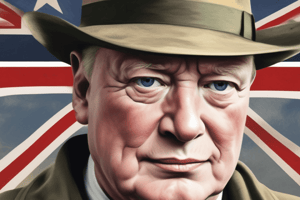Podcast
Questions and Answers
What was the primary purpose of the war coalition led by Winston Churchill?
What was the primary purpose of the war coalition led by Winston Churchill?
- To win the general election of 1945
- To lead a government of national unity (correct)
- To establish a Labour-led government
- To promote the Conservative Party ideology
What was the tone of Labour's rhetoric during the campaign?
What was the tone of Labour's rhetoric during the campaign?
- Warning against the dangers of socialism
- Filled with hope and optimism (correct)
- Focused on Churchill's wartime leadership
- Negative and aggressive
What was the significance of the 1945 general election in British politics?
What was the significance of the 1945 general election in British politics?
- It led to the formation of a government of national unity
- It marked the emergence of the Labour Party as a credible alternative (correct)
- It resulted in the re-election of Winston Churchill as Prime Minister
- It marked the decline of the Conservative Party
Why might Churchill's emphasis on his wartime leadership have been unsuccessful?
Why might Churchill's emphasis on his wartime leadership have been unsuccessful?
What rhetorical technique did Churchill employ in his speech, as evident from the introduction?
What rhetorical technique did Churchill employ in his speech, as evident from the introduction?
What was the result of the general election?
What was the result of the general election?
What was the primary audience for Churchill's speech on 4th June 1945?
What was the primary audience for Churchill's speech on 4th June 1945?
What was the historical significance of the Labour Party in 1945?
What was the historical significance of the Labour Party in 1945?
What might have been seen as contradictory in Churchill's speech?
What might have been seen as contradictory in Churchill's speech?
What was the impact of Churchill's speech on the electorate?
What was the impact of Churchill's speech on the electorate?
What was the context of Winston Churchill's speech on 4th June 1945?
What was the context of Winston Churchill's speech on 4th June 1945?
What was the context of Churchill's speech?
What was the context of Churchill's speech?
What was a significant factor in the 1945 election in Britain, in addition to choosing the next government?
What was a significant factor in the 1945 election in Britain, in addition to choosing the next government?
How did Churchill attack the Labour Party in his speech?
How did Churchill attack the Labour Party in his speech?
What is a central theme of Churchill's speech, in terms of his portrayal of the Labour Party?
What is a central theme of Churchill's speech, in terms of his portrayal of the Labour Party?
How does Churchill use the voters' sense of national identity and patriotism in his speech?
How does Churchill use the voters' sense of national identity and patriotism in his speech?
What is a key aspect of Churchill's argument against the Labour Party's solutions for post-war reconstruction?
What is a key aspect of Churchill's argument against the Labour Party's solutions for post-war reconstruction?
What is the underlying assumption of Churchill's attack on the Labour Party's ideology?
What is the underlying assumption of Churchill's attack on the Labour Party's ideology?
Study Notes
Historical Context
- In June 1945, World War II was coming to an end, and the UK was shifting its focus back to politics as usual.
- The war coalition led by Winston Churchill had accomplished its purpose, and the UK was preparing for a general election in July 1945.
The Gestapo Speech
- On June 4, 1945, Winston Churchill, the British Prime Minister and Conservative leader, addressed British voters in a speech broadcast on the radio.
- The speech was delivered in the run-up to the July 1945 general election, with the Labour Party emerging as a credible alternative to the Conservative Party.
Political Context
- The Labour Party had been part of the government of national unity during the war, with several ministers serving under Churchill.
- The Labour Party was now seeking to capitalize on the optimism surrounding the Beveridge Report and the end of the war, positioning itself as a credible alternative to the Conservative Party.
Churchill's Strategy
- Churchill's speech painted a nightmarish picture of what the UK could be under Labour, portraying himself as the wise, experienced politician who warns the British people against the dangers of socialism.
- However, this approach may have been seen as contradictory, given his previous collaboration with Labour ministers during the war.
- The speech may have come across as negative and aggressive, and emphasizing his status as the UK's war leader may not have been the right strategy, as voters may have been looking for a peacetime leader.
Consequences of the Speech
- Despite his popularity, Churchill's Conservative Party did not win the election, and the Labour Party achieved a landslide victory, paving the way for the creation of the Welfare State.
- The election was seen as a choice between different visions of post-war reconstruction, with the Labour Party's emphasis on social reform and the establishment of a welfare state proving popular.
Churchill's Attacks on Labour
- Churchill attacked the Labour Party aggressively, comparing them to the Gestapo, a powerful and evocative image in 1945.
- He argued that the Labour Party's solutions to rebuild the country would only lead to the destruction of freedom in the UK.
- Churchill used his status as Britain's great war leader to demonize the Labour Party, while portraying himself as the defender of freedom.
Studying That Suits You
Use AI to generate personalized quizzes and flashcards to suit your learning preferences.
Description
Test your knowledge of Winston Churchill's famous 1945 speech about the Gestapo, where he emphasized the importance of resistance against Nazi Germany. This quiz will guide you through the introduction, conclusion, and main body of the commentary, identifying key points and ideas. Are you ready to analyze this historical speech?




